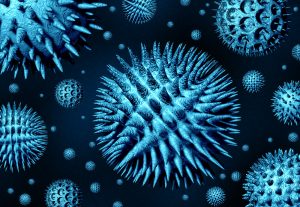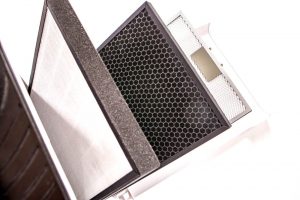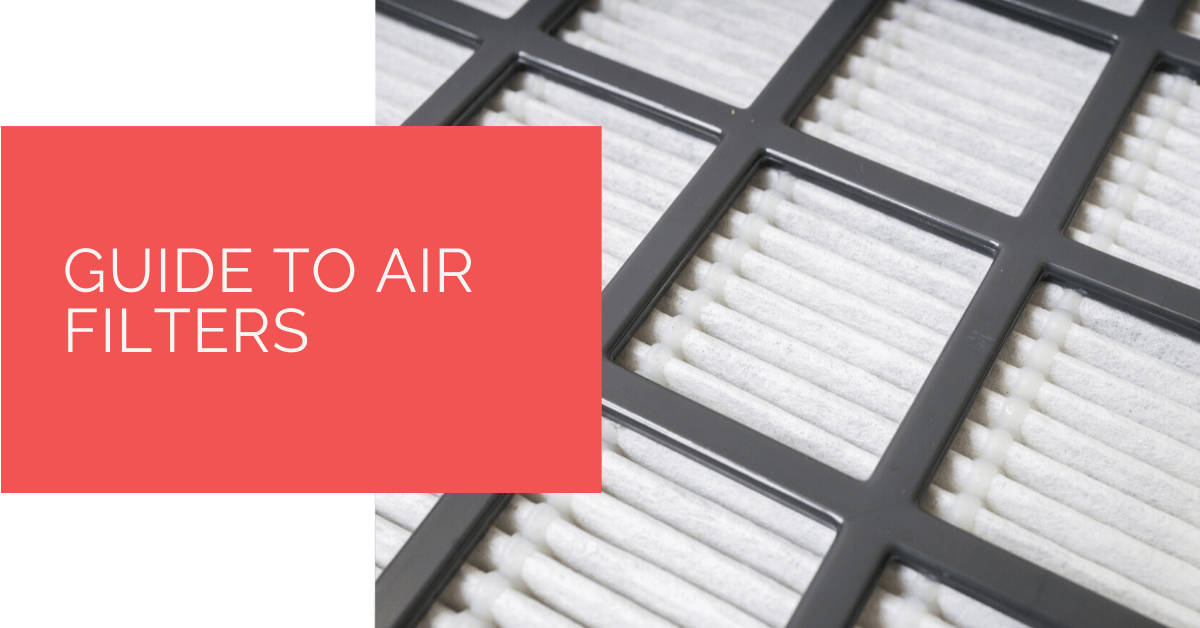Air quality is a real concern among many homeowners. Breathing contaminated air has many detrimental health effects such as recurring coughs, asthma and allergic reactions. Air pollution in a house can come from many sources such as dust particles, pet dust, odours from foods, cigarette smoke and other types of gaseous pollutants.
If you are looking to ensure that your home has quality, fresh and clean air, it is best to acquire and install an air filter. Choosing the best air filter is hard for many homeowners, given the many types of air filtration gadgets available in the market. However, you are in luck! This post will discuss the different types of air filters you can use to purify the air in your property and the pros and cons of these.
Contents
- 1 Key Takeaways
- 2 Types of Different Air Filters
- 3 Summary of Air Filters
- 4 Air Filters FAQ
- 4.1 What Benefits Will Get on Installing Carbon Air Filters?
- 4.2 How Do HEPA Filters Work?
- 4.3 What Are the Main Benefits of Installing HEPA Filters?
- 4.4 What Is the Difference Between HEPA Type Filters and True HEPA Filters?
- 4.5 What Does Ionic Filtration Mean?
- 4.6 How Do Negative Ions from an Ionic Purifier Kill Viruses?
- 4.7 What Is the Difference Between Hepa Filters and Ionic Filters?
- 4.8 What Are the Top Benefits of Using UV Air Purifiers?
- 5 Heat Pump Source: Reliable Heating and Cooling Solutions
- 6 Conclusion
Key Takeaways
- Homeowners concerned about air quality can benefit from air filters to combat contaminants such as dust, pet dander, odours, and pollutants.
- Different types of air filters have distinct pros and cons, with options like carbon filters for odour removal, HEPA filters for particle capture, UV filters for killing microorganisms, and more.
- Choosing the right air filter depends on your needs, environmental factors, and the contaminants you want to address in your indoor space.
Types of Different Air Filters
Carbon Air Filters
Carbon air filters usually remove gaseous pollutants such as pungent odours, volatile organic compounds (VOCs) released by common household items and strong odours from burning items such as cigarettes.
These filters usually have a bed of activated carbon with special properties that allow it to trap gas molecules and filter the harmful organic chemical substances in the gas. The air purification technology in these gadgets was first used during the first world war period in gas masks to trap the toxins released from chemical weapons.
It is worth noting that a carbon filter that is fully covered with toxins is ineffective. Once these filters trap enough organic substances on the surface of the activated carbon, you must change the carbon filter for the gadget to operate optimally. Additionally, carbon filters do not usually trap fine particles such as pet dust, pollen, mould or dust particles in the air.
Pros:
- These filters can remove harmful gaseous toxins that other filters cannot such as harmful fumes from cigarette smoke, paints and cleaning agents.
- Carbon filters can get rid of all types of odours and pungent smells allowing your home to have clean and fresh air.
Cons:
- These filters cannot get rid of dust particles and allergens
- Replacing the air filter in these gadgets can be expensive and hard
HEPA Air Filters
 High-efficiency particulate air (HEPA) filters are typically used to get rid of particle contaminants found in the air and are used in air purifiers. They are highly effective in getting rid of dust particles, pollen, pet dander, bacteria, mould and dust mites. Studies have shown that HEPA filters can get rid of particles contaminants that are as small as 0.1 microns. These types of filters are ideal for homeowners who suffer from chronic respiratory ailments, given that they have a 97% success rate in purifying particle contaminants from the air.
High-efficiency particulate air (HEPA) filters are typically used to get rid of particle contaminants found in the air and are used in air purifiers. They are highly effective in getting rid of dust particles, pollen, pet dander, bacteria, mould and dust mites. Studies have shown that HEPA filters can get rid of particles contaminants that are as small as 0.1 microns. These types of filters are ideal for homeowners who suffer from chronic respiratory ailments, given that they have a 97% success rate in purifying particle contaminants from the air.
Unfortunately, HEPA air filters are ineffective when it comes to getting rid of gaseous contaminants, odours and allergens.
Pros:
- They are highly effective in getting rid of even the smallest particle air contaminants
- They can get rid of bacteria and air-borne germs
Cons:
- They cannot get rid of VOCs, harmful fumes and other gaseous contaminants
- Once they capture bacteria and other micro-organisms, the captured contaminants can continue breeding and reproducing where they have been trapped by the filter until they are cleaned
UV Air Filters
UV air filters usually use electromagnetic radiation to kill micro-organisms such as bacteria, viruses, yeast and moulds as they float through the air.
UV air filters are best used in a sterile environment that does not have a lot of air contaminants. If you are going to use this type of filter in your property, it is best that you use it together with another kind of filter. This is because UV air filters cannot get rid of some contaminants such as solid particles, allergens and harmful gases and odours. It is only when used in conjunction with another type of filter that you can ensure total air purification.
Pros:
- UV air filters can completely kill microorganisms that can be harmful to your health such as germs, viruses, bacteria and old
- They are ideal in preventing respiratory illnesses and fostering better health
Cons:
- Some UV filters leave behind Ozone on killing microorganisms which can be a big health risk
- UV filters do not get rid of gaseous and particle contaminants in the air
Ionic Air Filters
Most air contaminants such as dust particles and allergens usually have a positive charge. Ionic air filters typically come with negative ion generators that usually attracts positively charged contaminants. Once positively charged contaminants interact with the negative charges from ionic filters, they usually become heavy and fall to the ground. Some ionic filters come with electrostatic precipitators that can capture ionized particle contaminants.
Ionic filters are ideal for getting rid of viruses, bacteria, gaseous toxins and fumes as well as bacteria. They are highly effective since they can get rid of contaminants that are as small as 0.01 microns. However, it is worth keeping in mind that these filters get rid of contaminants from the air, but they do not remove the contaminants from your house.
Pros:
- They can get rid of even the smallest air contaminants
- They help purify a wide range of contaminants including bacteria, viruses, toxic fumes and smoke
- They operate without producing any sounds
Cons:
- They cannot get rid of pungent odours
- They usually get rid of particles from the air but the particles usually fall on surfaces around your home
- The ionized particles left on surfaces in your home by ionic air filters can be a huge health risk especially to people who suffer from chronic health ailments
Pleated Air Filters
 Pleated filters are made from pliable materials that can fold such as cotton, paper and polyester. The folds usually trap air contaminants such as dust mites, mould spores, dust particles, virus, smoke, bacteria, viruses, pollen and pet dander.
Pleated filters are made from pliable materials that can fold such as cotton, paper and polyester. The folds usually trap air contaminants such as dust mites, mould spores, dust particles, virus, smoke, bacteria, viruses, pollen and pet dander.
Pleated air filters can capture tiny air contaminants which makes them ideal for indoor home use. However, to ensure that they remain effective, they should be cleaned regularly.
Pros:
- They can capture both huge and small particle contaminants as well as a wide range of air contaminants such as pollen, dander, bacteria and viruses
- Because of their effectiveness, they are ideal for home use if you suffer from chronic respiratory ailments such as asthma
- These filters can be cleaned and recycled
Cons:
- These filters cannot get rid of VOCs and odours
Fiberglass Air Filters
Fiberglass filters are best used to capture large particles that may be contaminating the air in your home. If you are looking to get rid of smaller sized air contaminants such as pet dander, mould spores, pollen or fine dust, you should consider getting another type of filter. Fiberglass filters can only be used once, and for this reason, they are commonly referred to as ‘disposable’ filters.
Pros:
- These filters can effectively capture contaminants that are large such as dust and lint
- Compared to other types of filters, fiberglass air filters are cheap
Cons:
- These filters need to be frequently replaced typically after every 30 days
- They do not effectively capture small contaminants such as pollen and bacteria and further, they cannot remove odours and pungent smells from the air
Washable Air Filters
As the name suggests, washable air filters are to air filters that can be cleaned and be re-used several times before they are finally disposed of. Remember that on filters tend to clog after capturing contaminants in the air for some time. For washable filters, you can remove the dust, debris and contaminants caught by the filter, and then clean the gadget to get optimal levels of air purification.
Pros:
- You get to save a lot of money on buying new filters
- Washable air filters are eco-friendly and reduce the carbon footprint on the planet
Cons:
- Cleaning washable air filters can be time consuming
- If left uncleaned, these filters will lose their effectiveness in removing air contaminants
Electrostatic Air Filters
These filters usually rely on a static charge to capture contaminants as they pass through the filtration area of an air purifier. As air passes through an air filter, contaminants with one charge are usually attracted by the opposite charge released by the gadget and stick to the filter media. Most electrostatic filters are re-usable, and they are highly effective in getting rid of even the smallest sized air contaminants. They can trap pollen, allergens, fine dust and other harmful substances in the air.
Pros:
- They can be can be re-used
- They are highly effective in getting rid of even the smallest contaminants
Cons:
- Electrostatic filters need to be cleaned regularly
- These filters produce ozone which can aggravate chronic respiratory diseases like asthma
Summary of Air Filters
Air filters are an essential component for many air conditioners, air purifiers and dehumidifiers. As you can see from the discussion above, there are many types of filters available in the market and they all have different capabilities, benefits and drawbacks. To choose the filter that works best for your household needs, you should consider your environment, contaminants that are most likely to be present in the air and your purification needs.
Air Filters FAQ
What Benefits Will Get on Installing Carbon Air Filters?
Some of the top benefits of installing carbon air filters include:
- These filters can filter all pungent smells, toxic fumes, odours and VOCs from the air in your house
- Once contaminants are captured by carbon filters, they are not usually released in the air again
- When properly maintained, carbon filters will allow you to breath clean and fresh air all year round
How Do HEPA Filters Work?
HEPA filters remove contaminants and pollutants from the air in your household in a 3-step process. The first step is usually forcing air through the filter. In the second step, larger contaminants are usually trapped by a fine mesh. In the third step, finer and smaller particles are captured by the second layer of the fine mesh before the purified air flows into your house.
What Are the Main Benefits of Installing HEPA Filters?
 HEPA filters have provided homeowners with a host of benefits. For starters, they can get rid of a host of pollutants, contaminants and allergens such as dust particles, pet dander, dust mites, pollen, lint and mould spores, bacteria and germs. On installing HEPA filters, you will be guarding yourself against a host of respiratory health complications. Another great thing about these filters is that they do not leave any Ozone behind during the air purification process.
HEPA filters have provided homeowners with a host of benefits. For starters, they can get rid of a host of pollutants, contaminants and allergens such as dust particles, pet dander, dust mites, pollen, lint and mould spores, bacteria and germs. On installing HEPA filters, you will be guarding yourself against a host of respiratory health complications. Another great thing about these filters is that they do not leave any Ozone behind during the air purification process.
What Is the Difference Between HEPA Type Filters and True HEPA Filters?
The main differences between True HEPA and HEPA Type filters lie in the effectiveness and pricing of the filters. True HEPA filters, also known as the ‘original’ filters have a 99.97% efficiency rate in air purification and they can capture particles that are as small as 0.3 microns. On the other hand, HEPA Type filters have an efficiency rate of around 99%, and they capture particles that as small as 2 microns.
What Does Ionic Filtration Mean?
Ionic Filtration refers to the process of air purification where contaminants are removed from the air by being bombarded with negative ion charges. When positively charged contaminants are bombarded with negative ion charges, they usually become heavy and fall to the ground leaving the air in a space clean.
How Do Negative Ions from an Ionic Purifier Kill Viruses?
Negative ions get rid of viruses by inhibiting their growth and limiting their reproduction.
What Is the Difference Between Hepa Filters and Ionic Filters?
HEPA filters purify through the use of fine meshes while ionic filters remove contaminants through bombardment with negative ionic charges. One major difference between these filters is that HEPA filters do not leave behind ozone and further they completely remove contaminants from the air and your house. Ionic filters, on the other hand, leave behind ozone and though they will purify the air your room, the contaminants will be left behind on surfaces.
What Are the Top Benefits of Using UV Air Purifiers?
UV air purifiers can kill and get rid of a host of air contaminants and disease-causing organisms that may be in the air you are breathing such as bacteria, germs, viruses and mould spores. With a UV purifier, you can get rid of a host of allergens meaning better overall health and less risk of contracting respiratory infections.
Heat Pump Source: Reliable Heating and Cooling Solutions
At Heat Pump Source, we take pride in our unwavering commitment to serving the UK with top-tier HVAC solutions. From the efficiency of heat pumps and the cool relief of air conditioning to the warmth of boilers, radiators, and underfloor heating, our dedicated team is always at the forefront of innovation. We understand the unique needs of every household and business, and we strive to provide dependable health and cooling products and services that are tailored just for you. Ensuring your comfort and satisfaction is our utmost priority. Whether you have questions, need guidance, or require support, we’re always here to assist. Please don’t hesitate to contact us; we’re eager to be of service.
Conclusion
Ensuring clean and healthy indoor air is a priority for homeowners. The diverse array of air filters available provides valuable solutions for addressing specific air quality concerns. Whether it’s the removal of odors, capturing particles, eliminating microorganisms, or other needs, there’s an air filter suited to your requirements. By considering your environment, the types of contaminants present, and your purification needs, you can make an informed choice to enjoy fresher, cleaner air in your home. Remember, the right air filter can significantly contribute to a healthier living environment for you and your family.
About the Author
At Heat Pump Source, our articles are the product of a collaborative effort among a team of highly skilled HVAC experts. Our dedicated professionals, hailing from diverse backgrounds in heating, ventilation, air conditioning, and refrigeration, contribute their extensive knowledge and experience to every piece of content. This multidisciplinary approach ensures comprehensive coverage. Our commitment is to deliver authoritative, reliable, and tailored advice to meet the unique needs of every household and business across the UK.

